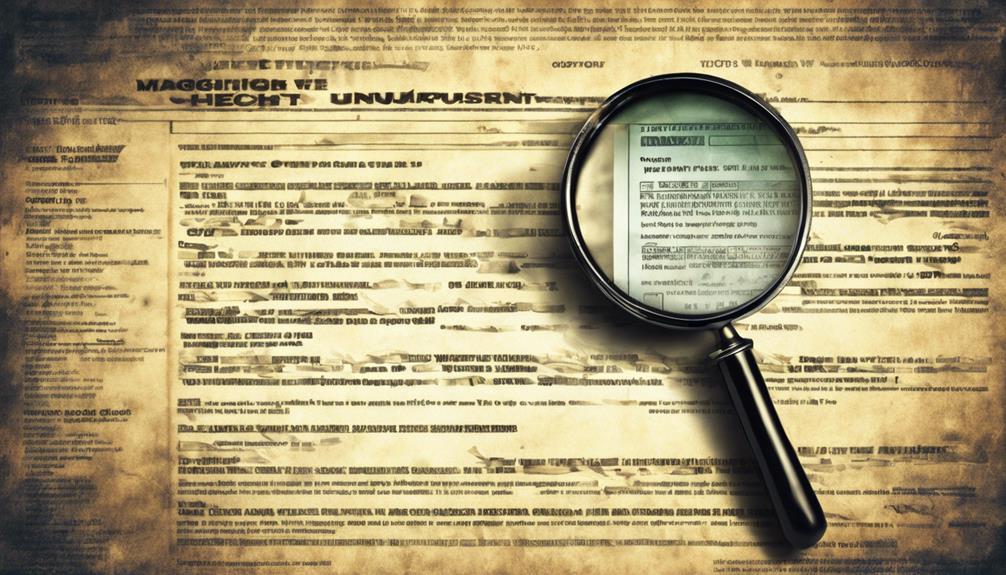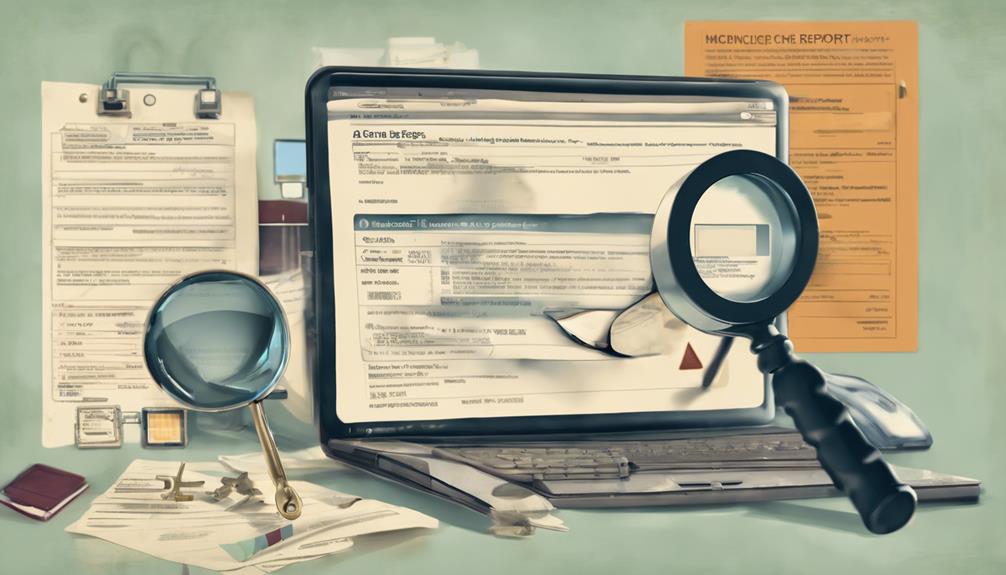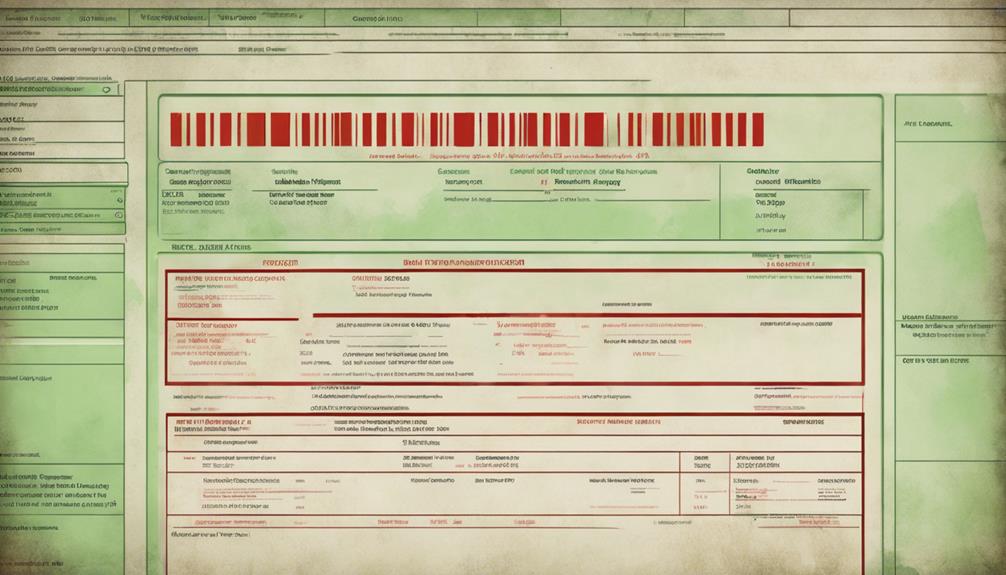Background Checks
Free Background Checks for Landlords: A Comprehensive Guide
Take advantage of free background checks for landlords in Texas to streamline the tenant screening process and ensure legal compliance.

For free background checks for landlords, understanding Texas tenant screening laws, avoiding common mistakes, and utilizing available resources are crucial. Know the screening process, secure applicant consent, focus on essential screening factors, and uphold legal obligations for an efficient process. Further insight into screening services, application requirements, efficiency strategies, and Texas laws will guarantee thorough understanding.
Key Takeaways
- Utilize reputable free tenant screening services for basic background checks.
- Consider paid services for more detailed background reports.
- Some websites offer free rental background reports for landlords.
- Real estate agents can provide guidance on checking rental history.
- Evaluate specific needs to choose between free and premium screening options.
Laws On Texas Tenant Screening

Texas tenant screening laws necessitate landlords to provide written notice of tenant selection criteria and obtain signed acknowledgment from applicants.
In Texas, there's no limit on application fees for tenant screening. Landlords must furnish applicants with a tenant criteria checklist outlining the requirements for rental properties.
Application fees in Texas are typically non-refundable unless landlords fail to provide the tenant criteria checklist. It's obligatory for landlords in Texas to maintain updated copies of the tenant criteria checklist for compliance purposes.
By adhering to these laws, landlords guarantee transparency in their tenant screening process and protect themselves from potential legal issues.
This strict adherence to Texas tenant screening laws not only benefits landlords but also safeguards the rights of prospective tenants, fostering a fair and equitable rental process for all parties involved.
Screening Mistakes To Avoid
Landlords should always prioritize obtaining applicant consent before proceeding with any background checks to guarantee compliance with legal requirements.
It's important to clearly communicate the non-refundable nature of application fees upfront to avoid misunderstandings and disputes later on.
Consent for Background Checks
Obtaining written consent from tenants before conducting background checks is a critical step in the tenant screening process to avoid legal complications and protect both parties' rights. Failure to secure proper consent can result in legal issues and violations of tenant rights.
Consent for background checks isn't just a best practice but a legal requirement to comply with state and federal laws. Proper documentation of tenant consent is essential for landlords to shield themselves from potential liabilities that may arise during the screening process.
Ensuring that tenants understand and authorize the background check process is fundamental in maintaining transparency and trust between landlords and tenants. By obtaining consent for background checks, landlords uphold the integrity of the screening process and demonstrate respect for tenant privacy and rights.
This standard practice serves to protect both landlords and tenants throughout the rental agreement.
Clear Application Fee
Before proceeding with the tenant screening process, it's essential to clearly communicate the non-refundable nature of the application fee to avoid misunderstandings.
Landlords should make sure that applicants provide consent for the background check before initiating the screening process. It's advisable to have a detailed tenant screening checklist outlining the criteria applicants need to meet and to have them sign an acknowledgment form indicating their understanding.
To prevent biased decision-making, landlords should rely on objective information obtained from background checks rather than subjective judgments.
Maintaining transparency throughout the screening process is vital. This includes utilizing proper paperwork and documentation to comply with tenant screening laws and regulations.
Resources For Tenant Screening In Texas

In Texas, tenants and landlords can access valuable resources for conducting thorough tenant screening processes. Texas Tenants Guide offers information on tenant screening laws and requirements in the state, important for complying with regulations.
The Move-In Move-Out checklist aids landlords in documenting property conditions pre and post-tenant occupancy. Property managers have relied on tenant screening services in Texas since these services provide free rental history and credit report checks.
Understanding the Texas Landlord/Tenants Statutes and Codes is vital for a fair housing process. Implementing a No Blank Space policy on rental applications ensures all necessary applicant information is provided.
Moreover, the Summary of Rights Under the FCRA outlines tenant rights regarding background checks and screening procedures, helping maintain transparency and compliance throughout the Texas rental screening process.
Texas Tenant Screening Process
Texas imposes specific screening laws on landlords, emphasizing the significance of applicant consent and transparent criteria. Landlords must adhere to these regulations to guarantee fair tenant selection and compliance with the law.
Understanding the Texas tenant screening process is vital for landlords to navigate the process effectively.
Texas Screening Laws
Landlords in Texas must communicate their tenant screening criteria clearly in writing to all applicants. Texas laws require landlords to provide written screening criteria to ensure transparency in the tenant screening process.
To adhere to Texas screening laws effectively, landlords should consider the following key points:
- Consistency: Landlords must maintain constancy in their screening procedures to prevent any legal complications.
- Application Fees: Application fees in Texas are typically non-refundable, emphasizing the importance of providing the tenant criteria checklist.
- Compliance: It's vital for landlords to comply with Fair Housing Act regulations as part of the screening process in Texas.
- Transparency: Clearly outlining the screening criteria helps both landlords and tenants understand the requirements and expectations throughout the application process.
Applicant Consent Requirement
Obtaining explicit permission from applicants is a vital step in conducting background checks during the tenant screening process in Texas. Landlords in Texas are required to obtain explicit consent from applicants before initiating any background checks. Failure to secure applicant consent can result in legal issues and potential violations.
By ensuring applicant consent, landlords comply with Texas laws and safeguard themselves from liabilities that may arise from unauthorized background checks. It's essential for landlords to clearly communicate the need for background checks to applicants and document their consent as part of the screening process. This not only demonstrates adherence to legal requirements but also establishes a transparent and accountable tenant screening process.
Obtaining applicant consent for background checks is a fundamental aspect of the tenant screening process in Texas, serving to protect both landlords and applicants alike.
Importance of Background Checks
To ensure a thorough screening process and mitigate risks, background checks play an important role in evaluating tenant suitability and reliability in Texas. Landlords rely on background checks to explore a tenant's rental history, credit details, and overall background, ensuring they make informed decisions when selecting tenants for their properties.
Verification of Tenant Identities: Background checks help confirm the identity of potential tenants, ensuring they're who they claim to be.
Assessment of Rental History: By reviewing a tenant's rental history, landlords can assess their past behavior as tenants, including payment consistency and property upkeep.
Evaluation of Credit Details: Checking credit details provides insight into a tenant's financial responsibility and their ability to meet rent obligations.
Reduction of Risks: Utilizing background checks minimizes risks associated with unreliable tenants, non-payment of rent, property damage, or other potential issues.
Effective tenant screening through detailed background checks is essential for successful property management and maintaining a positive rental experience for both landlords and tenants.
Selecting A Screening Service

Consider exploring different screening services to ensure thorough vetting of potential tenants. When selecting a screening service, it's essential to guarantee that the service offers detailed background checks on tenant applicants.
Look for services like RentPrep that provide reliable tenant screening packages, including checks for eviction history, bankruptcy records, and criminal backgrounds. By running these checks, landlords can gather necessary information to make objective decisions when choosing tenants.
It's important to avoid biased decision-making, so opting for a screening service that provides accurate and detailed reports is vital. Landlords should prioritize selecting a screening service that not only meets their needs but also adheres to legal regulations governing background checks.
Key Factors in Tenant Screening
Exploring key factors in tenant screening can greatly improve a landlord's ability to select reliable tenants for their properties. When conducting tenant screening, property owners should consider the following key factors:
- Background Check: Performing a thorough background check is essential to understand a potential tenant's rental history, criminal record, and any prior evictions.
- Rental Application: Reviewing a detailed rental application provides valuable insights into the applicant's employment history, income, and references.
- Credit Report: Analyzing a tenant's credit report can help assess their financial responsibility and ability to pay rent on time.
- Free Tenant Screening Services: Utilizing reputable free tenant screening services like RentPrep can offer cost-effective solutions for property owners looking to make informed tenant selections.
Application Process and Legal Obligations

Landlords must adhere to legal application obligations and follow process compliance guidelines to guarantee a smooth and lawful screening process. Understanding state-specific requirements and communicating these clearly to potential tenants can prevent misunderstandings and disputes.
Additionally, being aware of guidelines for fees, deposits, and response times is vital for maintaining professionalism and avoiding legal issues in Texas.
Legal Application Obligations
To guarantee legal compliance, landlords must familiarize themselves with state-specific screening requirements when managing rental applications. It's essential to grasp the guidelines set forth by Texas regulations to guarantee a smooth and legally sound application process.
Here are some key legal application obligations to ponder:
- Clearly Communicate: Landlords should clearly convey the rental application process to prospective tenants to evade misunderstandings and promote transparency.
- Understand Application Fees: Familiarize yourself with the regulations regarding application fees and deposits in Texas to comply with legal requirements.
- Prompt Response Times: Ensure timely response times to applications as required by law to prevent potential legal issues.
- Prevent Discrimination: Safeguard your business from discrimination lawsuits by adhering to legal obligations related to tenant screening and background checks.
Process Compliance Guidelines
To guarantee adherence to legal requirements and a smooth rental application process, landlords must carefully follow process compliance guidelines related to tenant screening, rental applications, background checks, credit reports, application fees, and legal obligations.
Familiarizing oneself with state-specific screening requirements is vital to ensure compliance with regulations and avoid potential legal issues. Clear communication of the rental application process to applicants is essential in preventing misunderstandings and maintaining transparency.
Additionally, understanding guidelines for application fees and deposits, especially in states like Texas, is necessary to prevent legal complications. Landlords should respond promptly to rental applications within the required turnaround time to uphold professionalism and efficiency in the process.
It's also crucial to protect the business from discrimination lawsuits by following legal obligations related to tenant screening and ensuring fair treatment of all applicants. By adhering to these process compliance guidelines, landlords can streamline their rental application process while staying compliant with the law.
Efficiency in Tenant Screening
Efficiency in tenant screening can be greatly enhanced by leveraging technology for automated processes. Tech-enabled property managers can streamline the screening process, saving time and eliminating manual applicant reviews.
By utilizing technology, property management operations can be simplified, making it easier to handle multiple screenings efficiently. This not only saves time but also guarantees a more comprehensive background check for each applicant.
Implementing efficient screening practices not only aids in finding suitable tenants but also helps in avoiding legal issues and discrimination lawsuits. Transparent communication throughout the screening process is essential for maintaining trust with potential tenants and ensuring a fair evaluation.
- Streamlining the screening process
- Saving time with automated procedures
- Guaranteeing thorough background checks
- Maintaining transparency and trust
Understanding Texas Screening Laws

Understanding Texas screening laws requires landlords to adhere to specific guidelines and regulations to guarantee compliance with state requirements. Landlords in Texas must clearly communicate their tenant selection criteria to all applicants.
Additionally, Texas laws outline rules regarding application fees and security deposits, ensuring transparency in the rental process. It's important to note that if tenant screening criteria aren't provided, landlords are obligated to refund the application fees.
Besides, compliance with the Fair Housing Act is vital for landlords in Texas to prevent discrimination based on protected characteristics.
Texas laws also specify detailed requirements for the tenant screening process, emphasizing the importance of following legal procedures when evaluating potential tenants.
How To Check Rental History In Texas
Accessing costless rental background reports in Texas can be done through various websites such as Zillow, Rentometer, and TurboTenant. These platforms allow landlords to input previous rental addresses and landlord names to obtain basic rental history details.
When considering how to verify rental history in Texas, landlords should keep in mind the following:
- Free services offer limited information and are a good starting point for basic checks.
- Paid services provide more detailed reports, including eviction histories, for a more thorough screening process.
Trusted real estate agents in Texas can offer guidance on conducting costless rental history checks and navigating the rental market effectively. Landlords should consider their specific needs, such as the level of detail required and the frequency of checks, when choosing between free and premium options for rental history checks in Texas. By weighing these factors, landlords can make informed decisions to guarantee reliable tenant screenings.
Frequently Asked Questions
What Background Check Do Most Landlords Use?
Most landlords typically use background checks that include credit history, criminal records, and eviction history to assess potential tenants. These checks help landlords make informed decisions and verify applicants' financial responsibility, identity, and rental history.
How Far Back Does Texas Go on Background Checks?
Texas background checks typically go back seven years for most criminal history information, with exceptions for specific types of crimes. Landlords should understand state and federal laws to conduct proper background checks on potential tenants.
How Extensive Are Background Checks for Apartments in Texas?
Background checks for apartments in Texas can include criminal history, credit, eviction records, rental history, employment verification, income verification, and reference checks. The extent varies based on landlord criteria and screening service used.
How Do I Check My Rental History in Texas?
To check rental history in Texas, individuals can request reports from tenant screening services, credit bureaus, and previous landlords. They should review payment history, lease violations, and eviction records for insights. Free services like Zillow and Rentometer offer basic details.
Conclusion
To sum up, being proactive in screening potential tenants can save landlords time, money, and potential headaches down the road.
By utilizing free background check resources and understanding Texas tenant screening laws, landlords can make informed decisions and protect their investments.
Remember, a little extra effort in the beginning can lead to a smoother and more successful landlord-tenant relationship in the long run.
Background Checks
Website for Free Background Checks: Are They Reliable?
Perusing free background check websites? Pause and ponder their reliability before proceeding to ensure informed decision-making.

Free background check websites may offer convenience, but their reliability is often compromised by limited sources and lack of human verification, raising concerns about the accuracy of the information provided. While these platforms can be useful for basic background checks, users should approach the results with caution due to the potential for inaccuracies stemming from unreliable sources and automated searches. It is important to understand the limitations of free background checks before relying solely on them for critical decisions. Explore further insights to make informed choices regarding background screening.
Key Takeaways
- Free background check websites lack reliability due to limited sources.
- Inaccuracies can result from lack of human verification and oversight.
- Legal compliance standards may not be met, posing risks for users.
- Users may face legal consequences from unreliable data.
- Automated searches without supervision impact data validity.
Reliability of Free Background Checks

Free background checks may lack reliability, posing concerns about the accuracy of the information provided. While free online background checks offer a convenient way to access certain information like criminal records, their reliability is often questioned due to limited sources and the lack of human verification. These free checks may not always be sourced from a reliable source, leading to potential inaccuracies. Automated searches without human oversight can further impact the accuracy of the results, as there's no assurance of the data's validity.
Moreover, the absence of thorough vetting processes in free background checks raises doubts about their reliability. The focus on providing information quickly and at no cost may compromise the accuracy of the results, potentially leading to incomplete or outdated information.
Additionally, the legal compliance of these free checks is a concern, as their limitations may not meet privacy standards or other legal requirements, posing further risks to individuals utilizing such services.
Risks Associated With Free Checks
Limited sources of information in background checks that are free pose inherent risks for users. Free background checks often rely on automated searches that lack human examination, impacting the accuracy of the results. This can lead to incomplete or inaccurate information being provided to users, potentially causing them to make decisions based on unreliable data.
Additionally, free background checks may not always adhere to legal compliance standards, exposing users to potential legal consequences.
Unreliable information: Due to the lack of verification and vetting processes, information obtained from free background checks may not be trustworthy.
Accountability issues: Users face challenges in holding free background check websites accountable for any errors or omissions in the provided information.
Potential legal consequences: Relying on incomplete or inaccurate data from free background checks can result in legal issues for users, emphasizing the importance of utilizing reliable sources for background checks.
Best Free Background Check Websites

The top free background check websites in 2024, including TruthFinder, BeenVerified, Intelius, Information.com, and Instant Checkmate, offer extensive reports on individuals' criminal records and financial history. These websites are known for their reliability and accuracy, making them valuable for various purposes such as pre-employment screening and personal protection.
Users can access detailed reviews and comparisons of these platforms to make informed decisions based on their specific needs. These free background check websites play an important role in providing essential information for individuals and organizations looking to conduct thorough background checks efficiently and effectively.
With their commitment to delivering accurate and reliable results, these platforms have become go-to resources for those seeking detailed and trustworthy information on individuals' backgrounds.
Legal Considerations for Free Checks
How important are legal considerations when utilizing background check services offered for free?
When it comes to free background checks, legal compliance is essential to avoid potential legal issues and liabilities.
Here are some key legal considerations to keep in mind:
- Consent: It's vital to obtain consent from individuals before conducting a background check, even if the service is free.
- Fair Credit Reporting Act (FCRA): Free background checks may not always comply with the FCRA, which sets guidelines for how background checks should be conducted.
- Ethical Screening Process: Using free background check websites without legal compliance can raise ethical concerns. Employers should guarantee a lawful and ethical screening process to make informed hiring decisions.
Employers should be cautious and guarantee that any background checks conducted, even through free services, adhere to legal regulations to maintain a fair and lawful hiring process.
Community Insights on Background Checks

Community members actively engage in discussions about the importance of detailed background checks for maintaining safety and quality in various industries.
Office administrators stress the importance of confidentiality in background checks to preserve trust and privacy within the workplace.
Recruiters emphasize the need to carefully choose online background check services for thorough vetting of potential candidates.
Staffing services prioritize conducting thorough background checks to uphold safety and quality standards in their hiring processes.
Distribution centers aim to enhance their background check procedures to minimize risks and ensure a secure work environment for employees.
In the field of staffing services, detailed background checks are considered essential to make informed hiring decisions and mitigate potential risks in the recruitment process.
Community insights highlight the vital role of reliable background checks, especially when dealing with public data for criminal background checks or employment backgrounds, underscoring the necessity for accurate and thorough vetting processes.
Frequently Asked Questions
Are Free Background Checks Legit?
Free background checks may lack reliability due to limited sources and human verification. Incomplete information, accuracy issues, and legal compliance risks are common. Lack of expertise can lead to unreliable reports, posing potential legal problems.
What Is the Most Accurate Background Check Website?
When seeking the most accurate background check website, users can rely on platforms like TruthFinder, known for a 95% accuracy rate. Its advanced algorithms and vast data sources guarantee reliable information, aiding in informed decisions.
How Reliable Are Online Background Checks?
Online background checks vary in reliability based on data sources. Paid services tend to offer more accurate information. Reliable checks are essential for informed decisions in employment and personal life. Accuracy depends on data collection methods and reporting precision.
How Do I Know if a Background Check Is Legit?
To validate a background check's legitimacy, individuals should ensure it complies with laws like the FCRA, prioritizes ethical use of data, and maintains transparency in data handling. Verifying professional affiliations and updated information supports reliability.
Can I Trust the Accuracy of Free Background Check Websites?
When it comes to free background check websites, many people question the reliability of the information provided. While some may offer accurate results, it’s essential to be cautious and verify the authenticity of the data. For truly reliable real background checks, it’s often best to use a paid, professional service.
Conclusion
To sum up, while free background check websites can be a convenient resource, their reliability may be questionable. According to a recent survey, only 30% of users found the information provided by free background checks to be accurate.
It's important for individuals to weigh the risks and legal considerations before relying solely on these services for important decisions.
Background Checks
Do Charges Appear on Background Checks?
Yes, charges can appear on background checks, potentially affecting job prospects and legal standing.

Yes, charges, whether convictions, pending cases, or warrants, can show up on background checks. These findings can impact job opportunities and legal matters for individuals.
Key Takeaways
- Charges such as arrests, convictions, and pending cases can appear on background checks.
- Types of charges, including misdemeanors and felonies, may impact background check results.
- DWI charges can affect background checks and employment opportunities.
- Pending charges are visible on background checks and can influence hiring decisions.
- Awareness of expunction and nondisclosure options can mitigate the impact of charges on background checks.
Types of Charges on Background Checks

Background checks can uncover a range of charges, such as criminal convictions, pending cases, and warrants. When it comes to types of criminal charges that may appear on background checks, individuals should be aware of the potential implications. These checks can reveal a variety of offenses, including misdemeanor charges like theft, vandalism, or drug possession, which are considered less severe than felonies.
Felony charges, on the other hand, involve more serious crimes such as assault, murder, or fraud and can have a significant impact on one's record.
Moreover, background checks may also show pending criminal charges, indicating ongoing legal proceedings against an individual. Arrest records might be included in these checks, reflecting instances where a person was taken into custody by law enforcement.
Understanding the types of criminal charges that can surface on a background check is vital for individuals seeking employment, as this information can greatly influence potential job opportunities.
Impact of DWI Charges on Records
How do DWI charges in Texas affect individuals' records on background checks?
DWI charges in Texas can have a long-lasting impact on one's record when it comes to background checks. These charges, whether dismissed, resulted in a conviction, or are pending, can appear on background checks indefinitely, potentially affecting employment opportunities.
However, there are options for individuals facing DWI charges to mitigate the impact on their records. For instance, dismissed DWI charges without probation may be eligible for deletion through expunction. Additionally, in specific circumstances, DWI convictions can be sealed with an order of nondisclosure.
It's essential for individuals with DWI charges to be aware that these records can be visible to potential employers during background checks. Understanding the options available, such as expunction and nondisclosure, can help individuals navigate the implications of DWI charges on their records in Texas.
Visibility of Pending Charges

Pending charges commonly appear on employment background checks, providing insight into ongoing legal matters for candidates.
In Texas, background checks may show pending charges as part of an individual's criminal record. The visibility of pending charges can vary depending on state laws and the specific approach taken by the employer or background check provider.
When considering candidates with pending charges, employers must carefully assess the relevance of these charges to the job position and the company's policies. It's vital for candidates to be transparent about any pending charges and be prepared to discuss them during the hiring process.
Employers should handle the presence of pending charges on background checks with sensitivity and in accordance with legal guidelines. Discriminatory practices based on pending charges should be avoided, and decisions should be made based on legitimate job-related reasons.
Employment Screening Laws
Employment screening laws, including the Fair Credit Reporting Act (FCRA), set guidelines for the use of background checks in making hiring decisions. These laws aim to guarantee that background checks are conducted fairly and in compliance with regulations.
The Equal Employment Opportunity Commission (EEOC) enforces Title VII of the Civil Rights Act, which prohibits discrimination based on criminal records revealed in background checks. State laws also play an essential role, as they may dictate what information can be reported in background checks, highlighting the importance of adherence to specific state regulations.
To maintain legal compliance, employers are required to obtain written consent from candidates before conducting background checks. Additionally, individuals have the right to challenge and correct any inaccurate information found in their background checks under employment screening laws.
Components of Background Checks

Background checks encompass a range of essential components like arrest record visibility, the expunction process overview, and prospective employer awareness. These elements play a pivotal role in providing a thorough assessment of an individual's background.
Understanding how these components interplay is important for ensuring accurate and informed decision-making in the hiring process.
Arrest Record Visibility
Arrest records, detailing past legal involvement, are a crucial part of background checks, offering a detailed overview of an individual's criminal history.
Employers may access arrest records, including charges that were filed, even if they were later dismissed.
Background checks cover arrests, convictions, court records, and warrants, presenting a thorough picture of an individual's criminal background.
The visibility of arrest records on background checks can greatly impact employment opportunities, as employers consider a candidate's legal history.
Understanding the components of background checks, such as arrest record visibility, enables individuals to anticipate what information potential employers might discover.
Given the impact arrest records can have on employment prospects, individuals should be aware of what these records entail and how they might be perceived by those conducting background checks.
Being informed about the inclusion of arrest records in background checks allows individuals to prepare adequately and address any concerns employers may have regarding their past legal involvement.
Expunction Process Overview
Considering the importance of expunction in clearing one's criminal history from background checks, understanding the procedural overview of this process is vital for individuals seeking to move forward with a clean record.
The expunction process typically involves filing a petition through a criminal defense lawyer and obtaining a judge's approval. This legal remedy allows for the removal of past arrests from public record, including dismissed charges. Once expunction is granted, individuals can legally deny any past arrests that have been expunged on job applications.
Expunction plays a pivotal role in clearing one's criminal history from public databases and background checks, providing a fresh start by eliminating dismissed charges. By following the necessary steps and seeking the assistance of a criminal defense lawyer, individuals can navigate the expunction process effectively to make sure that their past arrests don't appear on future background checks.
Prospective Employer Awareness
When employers conduct background checks, they have visibility into various aspects of an individual's history, including arrest records and other pertinent details. Prospective employers are privy to a range of information that can influence their hiring decisions.
Here are some key points regarding prospective employer awareness in background checks:
- Charges: Employers can see both pending and past charges on a background check, even if the charges were ultimately dismissed.
- Background Checks: These screenings encompass criminal history details such as arrests, convictions, and court records.
- Court Records: Information from court records plays a vital role in background checks, providing insight into legal matters related to the individual.
- Consideration: Prospective employers often evaluate the nature of charges and their significance to the job when examining background check results.
Being aware of what prospective employers can access in a background check allows individuals to prepare and address any concerns that may arise during the hiring process.
Handling Pending Charges in Texas
Employers in Texas must consider pending charges when evaluating candidates during background checks.
Pending charges are part of a candidate's criminal record and can influence hiring decisions.
It's essential for employers to carefully assess the visibility and potential impact of pending charges on their evaluation criteria.
Pending Charge Visibility
Regularly, pending charges in Texas background checks must be thoroughly assessed to guarantee compliance with legal requirements and make informed hiring decisions. When handling pending charges in background checks, employers should consider the following:
- Understanding of Pending Charges: Pending charges refer to prosecutor-filed charges awaiting resolution in court, without a plea agreement or trial outcome yet.
- Visibility Factors: The visibility of pending charges on background checks varies based on state laws, search type, and the severity of the charge.
- Employer Responsibilities: Employers must verify the accuracy of criminal record information, assess pending charges in the context of the job, and adhere to EEOC guidance to prevent discrimination.
- Legal Compliance: Ensuring legal compliance when dealing with pending charges is essential for making well-informed hiring decisions. Consultation with legal experts can aid employers in managing this process effectively.
Employer Evaluation Criteria
Understanding how employers in Texas evaluate pending charges involves considering various factors such as relevance to the job, recency, severity, and potential impact on workplace safety. Employers evaluate pending charges based on the nature of the offense, job responsibilities, time elapsed since the charge, and the candidate's explanation.
They may also consider industry standards, legal requirements, company policies, and potential risks associated with the charges. Candidates should be prepared to provide context, updates on the case status, and demonstrate positive changes or rehabilitation efforts.
It's essential for employers to handle pending charges ethically, fairly, and in compliance with federal and state laws to avoid discrimination or legal repercussions. By adhering to proper employer evaluation criteria, companies in Texas can make informed decisions when assessing candidates with pending charges, ensuring a fair and lawful hiring process.
Understanding Criminal Charges

Criminal charges on background checks can have significant implications for individuals seeking employment opportunities. Understanding the nuances of how criminal charges are reflected in background checks is essential for job seekers.
Here are some key points to take into account:
- Types of Charges: Background checks may reveal various kinds of criminal charges, including arrests, convictions, and pending charges.
- Pending Criminal Charges: Background checks might show pending criminal charges that are still unresolved, which could impact a candidate's job prospects.
- Dismissed Charges: Even if charges were dismissed, they might still appear on a background check if they weren't expunged from the individual's record.
- Significance for Job Seekers: Job seekers should be aware of how criminal charges can impact their chances of securing employment and be prepared to address any concerns that potential employers may have regarding their background.
Employer Considerations on Charges
Employers evaluating candidates for job positions often take into account the nature and severity of any charges revealed during background checks. Pending charges, although not convictions, can influence hiring decisions. Employers must adhere to Equal Employment Opportunity Commission (EEOC) guidelines to ensure fair treatment of candidates with pending charges. It is essential for candidates with pending charges to be prepared to provide context and explanations to potential employers. Before making a hiring decision, employers may assess the relevance of pending charges to the job position. This consideration is crucial in determining whether the charges pose a risk or conflict with the responsibilities of the role.
| Employer Considerations on Charges | |
|---|---|
| Pending Charges | Hiring Decisions |
| Nature and Severity | Relevance to Position |
| EEOC Guidelines | Context from Candidates |
Legal Remedies for Background Check Results

Seeking legal remedies such as expunction offers individuals the opportunity to remove dismissed charges from public record, thereby preventing them from appearing on background checks in Texas.
When considering legal actions for background check results, individuals should be aware of the following:
- Expunction Benefits: Expunction allows for the complete removal of dismissed charges from public databases, ensuring they don't show up on background checks.
- Legal Process: The expunction process involves filing a petition, attending a court hearing, and obtaining a judge's approval before the records can be cleared.
- Impact on Job Applications: After expunction is granted for dismissed charges, individuals can legally deny any past arrests on job applications.
- Clean Slate: Expunction provides individuals with a clean criminal record by making expunged records inaccessible to potential employers conducting background checks.
Frequently Asked Questions
Do Pending Charges Show up on Background Checks in Texas?
Pending charges in Texas will generally appear on background checks conducted by employers. Employers might view pending criminal charges as part of a candidate's criminal history, potentially impacting employment decisions. Handling pending charges carefully is essential to avoid issues.
Do Pending Charges Show up on a Background Check in Michigan?
In Michigan, do pending charges reflect on background checks? Employers may see pending charges depending on the check type and charge severity. Candidates can dispute inaccuracies and explain to potential employers, ensuring fair assessment.
Do Pending Charges Show up on a Background Check in Ny?
Pending charges in New York can show up on background checks, allowing employers to access ongoing legal proceedings. Candidates should address these charges proactively to provide context. Employers may consider pending charges when evaluating suitability for a position.
What Does a Background Check Show in Texas?
In Texas, background checks reveal criminal records, including arrests and court outcomes. Employers can access pending charges info. Education, employment, and credit history may also be included. Knowing this helps candidates prepare for job screenings.
Can Misdemeanors Affect the Outcome of a Background Check?
Yes, misdemeanors on background checks can affect the outcome. Employers often consider the nature and severity of the offense, how long ago it occurred, and how it relates to the job. Some companies may exclude candidates with certain misdemeanors, while others may be more lenient.
Conclusion
To wrap up, charges certainly do appear on background checks! It's like shining a spotlight on a person's past, revealing every misstep and mistake they've made.
So, it's important to address any pending charges head-on and be prepared to explain them to potential employers. Remember, the truth always comes to light, whether you like it or not.
Background Checks
Background Checks Companies in India: Top Picks
Curious about top background check companies in India? Catch a glimpse of Proquest Consulting's cutting-edge AI solutions and expert verifications.

In India, Proquest Consulting shines as a top pick for background checks, employing AI and skilled teams for meticulous verifications. With a track record of screening over 1 lac candidates and spotting 3k discrepancies, they offer dedicated software and personalized support. Their focus on detailed background checks sets high standards in the HR industry. If you're looking for reliable verification services, Proquest Consulting's commitment to privacy and expertise in vetting new hires make them a preferred choice.
Key Takeaways
- Utilizes machine learning for extensive background checks
- Screened over 1 lac candidates and identified 3k discrepancies
- Offers dedicated software and personalized manager support
- Specializes in employee vetting for new hires and senior roles
- Trusted for thorough background screening services
Top Background Verification Companies

Proquest Consulting leads the list of top background verification companies in India. With a reputation for being a trusted partner, ProquestCS stands out as an Indian-based background verification company offering all-encompassing screening solutions.
Their expertise in employee background verification is coupled with cutting-edge technologies like AI and Machine Learning, ensuring global background screening standards are met. ProquestCS boasts a skilled team that has successfully screened over 1 lac candidates, uncovering 3k discrepancies, showcasing their commitment to thorough background checks.
Companies rely on ProquestCS for their meticulous approach to screening, providing peace of mind in the hiring process. By offering dedicated software and personalized managerial support, ProquestCS aims to streamline the verification process, making them a go-to choice for businesses looking for reliable and efficient background screening services.
Leading HR Verification Services
Leading the way in HR verification services is Proquest Consulting, a top-ranked background verification company in India with over a decade of experience. Proquest Consulting has established itself as a global leader in background screening solutions, specializing in detailed background verification for employment purposes.
Utilizing advanced technologies like AI and Machine Learning, Proquest Consulting offers professional background checks, including education and employment verification, to assist companies in making informed hiring decisions.
With a track record of identifying 3,000 discrepancies in their verification processes and screening over 100,000 candidates, Proquest Consulting has built a reputation as one of the most trusted background verification companies in India. Their specialized team, dedicated software, and assigned manager for seamless processes have made them a go-to choice for numerous companies seeking thorough and reliable background checks.
Proquest Consulting's commitment to excellence has set a high standard in the industry for effective HR verification services.
Trusted Background Check Providers

A key aspect of trustworthy hiring decisions lies in partnering with reputable background check providers in India. When it comes to trusted background verification companies in the country, Proquest Consulting stands out with over a decade of industry experience.
Having screened more than 1 lac candidates and uncovered 3k discrepancies, ProquestCS offers a thorough range of services including employee screening for various corporate sectors. Their specialization in vetting new hires and senior-level positions ensures a detailed background verification process that includes employment verification and criminal background checks.
ProquestCS is known for its commitment to data privacy and provides dedicated software along with a dedicated manager as a single point of contact, streamlining the hiring process for their clients. Many companies rely on ProquestCS for their reliable and precise background screening services.
Reliable Verification Firms
When seeking reliable verification firms for background checks in India, companies look for established providers with a proven track record of accuracy and efficiency.
Proquest Consulting stands out as one of the best background verification companies in the country, boasting over a decade of experience in the industry. With a focus on thorough background check services, ProquestCS utilizes AI and Machine Learning technologies to offer a wide range of screening solutions.
Their global background verification company has screened over 1 lac candidates, identifying 3k discrepancies, and providing trusted background check services to various corporate sectors. ProquestCS not only offers reputable background verification services but also specializes in employee background screening services, ensuring meticulous checks on criminal, educational, and credit histories.
Clients benefit from their dedicated software and assigned manager for a seamless experience, making them a top choice for companies looking to build skilled and reliable long-term teams.
Top Picks for Background Checks

Proquest Consulting emerges as a top contender among the best picks for conducting thorough background checks in India.
As a leading Indian background verification company, ProquestCS leverages machine learning algorithms to offer extensive background verification checks, including criminal record checks, employment verification, and more.
With a track record of screening over 1 lac candidates and spotting 3k discrepancies, ProquestCS stands out for its commitment to accuracy and reliability.
Their dedicated software, personalized manager support, and extensive database coverage guarantee swift turnaround times and seamless integration into the recruitment process.
Trusted by numerous companies across various industries, ProquestCS focuses on creating strong, skilled teams for their clients, making them a preferred choice for background screening and verification services in India.
For those seeking the best background check services, Proquest Consulting is a top recommendation with a proven reputation for excellence.
Frequently Asked Questions
What Is the Most Popular Background Check Company?
The most popular background check company is HireRight. They serve over 240 countries worldwide and provide a full range of background check services. Many industries trust HireRight for their reliable and thorough background verification needs.
Which Company Has Strict Background Verification in India?
In India, Proquest Consulting stands out for its rigorous background verification process. With over 3k discrepancies identified, their attention to detail shines. Trusted by many, their specialized team guarantees thorough screening across various sectors.
What Background Check Do Employers Use in India?
Employers in India utilize background checks to verify education, employment history, criminal records, identity, and references of potential candidates. These checks are essential for ensuring credibility, reliability, and integrity in the Indian workforce, aiding informed hiring decisions.
What Is the Highest Level Background Check?
The highest level background check involves thorough examination of an individual's criminal, financial, educational, and professional history. It includes scrutiny of international records, credit history, and reference checks, essential for positions of high trust and responsibility.
Can Tabb Background Checks be Considered as one of the Top Picks for Background Check Companies in India?
When considering background check companies in India, the reliability of Tabb background checks makes it a top pick for many. With its comprehensive screening services and efficient processes, Tabb has gained a reputation for delivering accurate and thorough results, making it a trusted choice for businesses and individuals alike.
Conclusion
To sum up, when it comes to background checks in India, these top picks for verification companies are the go-to choice for reliable and trusted services.
Did you know that according to a survey by NASSCOM, over 70% of Indian companies conduct background checks on potential employees before hiring them?
This statistic highlights the importance of thorough verification processes in today's competitive job market.
-

 Background Checks4 months ago
Background Checks4 months agoFind Someone Fast: People Search by Birthday
-

 Background Checks4 months ago
Background Checks4 months agoThe Truth About Cyber Background Checks: What You Need to Know
-

 Arrest Warrants4 months ago
Arrest Warrants4 months agoMissouri Arrest Warrants: How to Find Them
-

 Arrest Warrants4 months ago
Arrest Warrants4 months agoWarrants for Arrest in NY: Search and Information
-

 Arrest Warrants4 months ago
Arrest Warrants4 months agoSearch Arrest Warrants: A Complete Guide
-

 Background Checks4 months ago
Background Checks4 months agoNew Law on Background Checks in Texas: What Has Changed
-

 Arrest Warrants4 months ago
Arrest Warrants4 months agoActive Arrest Warrants – Why You Should Care About Them
-

 Arrest Warrants4 months ago
Arrest Warrants4 months agoVirginia Arrest Warrants: How to Look Them Up













